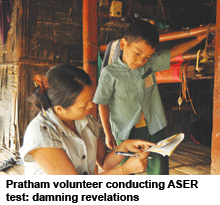Notwithstanding tall claims to the contrary by the Congress-led UPA-II government which is now in the final year of its five-year term in office at the Centre, primary education in India is in a tailspin. This is confirmed yet again by the Annual Status of Education Report (ASER) 2012 — a nationwide survey which measures the learning outcomes in (government and private) rural primaries (classes I-VIII) annually. Conceptualised and brilliantly executed by the highly-respected Mumbai-based education NGO Pratham (estb. 1994), its latest annual report/survey is the outcome of 30,000 volunteers (mainly college students) fanning out to 16,000 villages in 567 of India’s total 640 districts, and actually testing the (vernacular) language and maths skills of 600,000 sample children.
 Damningly, ASER 2012 reveals that in most of the 29 states and five territories of the Indian Union, the learning outcomes of primary school children are three years behind the expected level. In 2010, 46.3 percent of class V students in the country couldn’t read and comprehend class II textbooks. Two years on, 53.2 percent can’t. Likewise, the percentage of class III students who can’t grasp class I textbooks has increased from 54.4 percent in 2010 to 61.3 percent. In numeracy as well, learning outcomes of primary children are plunging. In 2010, of all class V children, 29.1 percent couldn’t solve a two-digit subtraction problem. This has leapfrogged to 46.5 percent in 2012.
Damningly, ASER 2012 reveals that in most of the 29 states and five territories of the Indian Union, the learning outcomes of primary school children are three years behind the expected level. In 2010, 46.3 percent of class V students in the country couldn’t read and comprehend class II textbooks. Two years on, 53.2 percent can’t. Likewise, the percentage of class III students who can’t grasp class I textbooks has increased from 54.4 percent in 2010 to 61.3 percent. In numeracy as well, learning outcomes of primary children are plunging. In 2010, of all class V children, 29.1 percent couldn’t solve a two-digit subtraction problem. This has leapfrogged to 46.5 percent in 2012.
According to Madhav Chavan, the promoter-chief executive of Pratham, the decline in primary learning outcomes has been steeper since 2010, when the RTE Act came into effect. “There’s general agreement that the RTE Act has led to relaxation of classroom teaching since all exams and assessments are scrapped, and every child is automatically promoted until class VIII,’’ says Chavan.
This analysis which can’t be faulted, proves yet again that government intervention driven by populist motives does more harm than good. Moreover, it’s not just deteriorating learning outcomes which question the efficacy of the RTE Act in improving standards of elementary education in the country. The report also confirms there is a swelling exodus of children to private schools. According to ASER 2012, 29.1 percent of rural primary children (classes I-V), and 28 percent of upper primary children (classes VII-VIII) are in private schools against 23 and 25 percent respectively in 2010. “Private school enrolment in rural India is increasing at about 10 percent every three years or about 3 percentage points per year. In the election year of 2014, 41 percent of all of India’s primary age children will be in private schools, and by the time elections come around in 2019, the private sector will be the major formal education provider in India,” comment the authors of ASER 2012.
Maharashtra has emerged as one of the states experiencing the steepest decline in reading-skill levels of children. More shockingly even in private schools in Maharashtra (40 percent of primary students are enroled in private schools), there’s been a decline in reading and mathematics learning outcomes across all age groups.
“There is general apathy towards education in Maharashtra. Perhaps children and parents feel there is no need to study as all are passed automatically. This no-fail policy is enshrined in the RTE Act, and was enforced in Maharashtra in 2010 by way of a government order. Since then, declining trends are visible in the state. Guarantee of access to education is meaningless without satisfactory learning outcomes. There are huge implications for equity and growth for Maharashtra if basic learning outcomes don’t improve soon,” says Usha Rane, the Mumbai-based director (content and training) of Pratham.
The law of unintended consequences becomes operational when fools rush in where angels fear to tread.
Praveer Sinha (Mumbai)
Skewed priorities
The primary objective of all political parties with representtation in the Pune Municipal Corporation (PMC) — Maharashtra’s second richest civic government with a budgeted expenditure of Rs.3,633.02 crore in 2012-13 (after Mumbai’s BMC budget of Rs.21,000 crore) — is to tighten their grip over the corporation. Quite evidently this is the objective of the Sharad Pawar-led NCP which has made it a practice to ally with the second largest party or combination — Shiv Sena-BJP (2007-12) and Congress since February last year. Through such opportunism, NCP has clung to power in PMC without doing anything worthwhile to solve the problems plaguing the city, specifically about upgrading the dismal quality of education delivered in its 319 Marathi, Urdu, Kannada and English medium schools with an aggregate enrolment of 110,000 students.
While the annual expenditure of PMC’s school education board approved on December 31 for 2013-14, is 18 percent higher at Rs.297.78 crore, there’s hardly any provision made for improving the quality of education delivered in the corporation’s schools. Almost 80 percent (Rs.233 crore) of the budget is to be spent on salaries, pension and gratuity of 2,400 teachers who show few signs of dedication or commitment to their work.
A break-up of the Rs.297.78 crore PMC allocation for school education indicates the priorities of the NCP-Congress corporators who formulated the 2013-14 budget. For instance, Rs.4 crore has been earmarked for cleaning and miscellaneous repairs of school buildings; another Rs.4 crore for purchase of furniture; Rs.2.5 lakh has been set aside for a new yoga training programme out of which Rs.2 lakh will be spent as salaries for yoga teachers.
Moreover this fiscal, PMC’s education board budgeted a doubled expense of Rs.10 lakh, to fund a day-long procession on February 19 to commemorate the birth anniversary of Chhatrapati Shivaji Maharaj (1630-1680). “We have hired private agencies to demonstrate traditional warrior tactics, archery and wrestling, apart from classical music performances, to recreate the Shivaji Maharaj era,’’ says PMC’s education board chairman, Pradip Dhumal.
Educationists in Pune, which advertises itself as the education and cultural capital of Maharashtra (pop. 112 million), are aghast at the PMC’s spending priorities at a time when the corporation’s primary schools are going from bad to worse. According to a survey conducted last October by Action for Rights of the Child (ARC) — an NGO offering remedial education to slum children who have completed classes III-IV in PMC primaries — over 75 percent of children in classes III-IV couldn’t negotiate basic subtraction sums involving two-digit numbers; 92 percent can’t solve a simple division sum and over 47 percent of girls and 53 percent of boys couldn’t read or narrate a short story written in their native Marathi (273 of 319 PMC schools offer Marathi-medium education). The report was submitted to the PMC’s education board in October but has quite obviously been consigned to the archives.
 The curiously skewed priorities of PMC’s education board can be ascribed to the poor quality of its members. Although the Bombay Provincial Municipal Corporations Act, 1949 (the enabling legislation of PMC) allows PMC’s general body to nominate educationists and experts to its 16-member education board, in practice the nominees are drawn from within PMC’s elected members, most of whom have dropped out of school. Conveniently, a website dedicated to the school education board launched with much fanfare last December, fails to provide any information about the education qualifications, duties, or remuneration of board members, as required by s. 4 of the Right to Information Act, 2005.
The curiously skewed priorities of PMC’s education board can be ascribed to the poor quality of its members. Although the Bombay Provincial Municipal Corporations Act, 1949 (the enabling legislation of PMC) allows PMC’s general body to nominate educationists and experts to its 16-member education board, in practice the nominees are drawn from within PMC’s elected members, most of whom have dropped out of school. Conveniently, a website dedicated to the school education board launched with much fanfare last December, fails to provide any information about the education qualifications, duties, or remuneration of board members, as required by s. 4 of the Right to Information Act, 2005.
“PMC’s education board should invest in teacher training to enable teachers to conduct classes in English and make schools inclusive for differently-abled students. Moreover, the cause of educating poor household children who attend PMC schools would be served if the education board reaches out to private schools to help in providing quality education. But for all of this, there first needs to be political will,” says Vivek Velankar, president of the Pune-based NGO Sajak Nagrik Manch, which works as a pressure group monitoring the city’s civic bodies through usage of the Right to Information Act, and has been protesting the flawed composition of the PMC’s education board.
Quite clearly, PMC education board members are yet to appreciate that dedicated, competent and professionally qualified teachers are the precondition of quality education and improved learning outcomes. New furniture and fixtures, yoga classes and celebrations come next.
Swati Roy (Pune)























